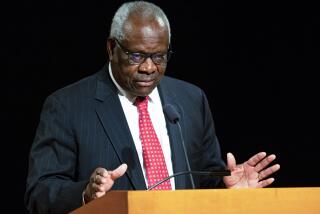The Case of Meese Vs. Miranda : His Attacks Speak to His Constituency, Not to the Law
- Share via
Last year the recognition that the Miranda ruling was an attempt to strike a proper balance between law-enforcement interests and a suspect’s rights--and not, as is widely believed, designed to do everything possible to prevent a suspect from talking to the police--came from the Burger court, of all places.
Speaking for herself and five other members of the U.S. Supreme Court (including then-Chief Justice Warren E. Burger and his replacement-to-be, Justice William H. Rehnquist), Justice Sandra Day O’Connor recalled that the Miranda ruling had rejected “the more extreme position that the actual presence of a lawyer was necessary to dispel the coercion inherent in custodial interrogation.” Instead, the Warren court had settled for a system of police-issued warnings (for example, “You have a right to remain silent”; “anything you say can be used against you”) that permits someone subjected to the pressures of arrest and detention to “waive” his rights without actually getting the guidance of counsel. Depending on one’s viewpoint, this is the Miranda case’s great weakness or saving grace.
I believe that the present court’s view of Miranda as a compromise--as a serious effort to strike a proper balance between competing interests--is quite significant. This is the way Miranda’s defenders, not its critics, have talked about the case for the past 21 years.
Burger, who built a national reputation as a “law-and-order” judge before ascending to the high court and who did little to change his image thereafter, made the surprising disclosure recently that he never was in favor of “flatly overruling” Miranda. Doing so, the former chief justice pointed out, might be construed by the police as giving them “a hunting license”; they might think that they could do “anything they wanted.”
Atty. Gen. Edwin Meese III, however, has left no doubt that on this issue he is well to the right both of the former chief justice and of the present Supreme Court. Meese has attacked the Miranda ruling previously. A year and a half ago he called Miranda an “infamous” case that “only helps guilty defendants.” But on that earlier occasion he softened the blow by adding, “If a person doesn’t want to answer, that’s their right.” This statement indicated that, although the attorney general was opposed to giving suspects the now-familiar warnings, he was prepared to honor the right to remain silent and the right to counsel if a person was sufficiently poised and knowledgeable to assert these rights on his own initiative.
But now Meese has taken a more extreme position. He endorsed and publicized a Justice Department report rejecting the view that a person should be able to cut off police interrogation by expressing an unwillingness to talk or by asking for a lawyer. The report calls such persons “uncooperative suspects,” and sees no reason why “a reasonable effort” should not be made to “persuade” them to change their minds.
Meese is no longer content with having the police exploit people’s ignorance of the law. Now he wants the police to be able to persuade people who know their rights not to exercise them. I would be astonished if the court were to permit the police to resort to such “persuasion.”
Jesse Choper, the dean of the UC Berkeley Law School, fails to see why the attorney general should be criticized for what he is trying to do. Choper observes: “To ask the court to overrule one of its decisions is as honorable and proper a way to seek change in constitutional law as our system contemplates. He’s only asking the court to see the error of its ways. We do that all the time.”
But Herman Schwartz of the American University Law School, a veteran court-watcher and the editor of a forthcoming book about the Burger court, views the matter differently: “This is not the way a lawyer challenges a Supreme Court decision. A lawyer raises the issue in court, not by issuing a press release.”
Schwartz likes the Miranda ruling. Former Deputy Solicitor General Andrew Frey detests it. Before entering private practice last year, Frey had been the leading criminal-law specialist in the solicitor general’s office for a dozen years. But Frey agrees with Schwartz that whether or not the attorney general’s tactics are proper, they are unlikely to be effective. Indeed, they are likely to be counterproductive. “First of all,” Frey observes, “the court is in no mood to overrule Miranda. As far as the justices are concerned, Miranda has been working all right, and they are confident they can keep it ‘under control.’ In the second place, if you want to overrule a landmark case you should work quietly, slowly and patiently. You shouldn’t launch a frontal assault. That only makes your task much harder. That only makes the ‘middle-road’ justices bristle.”
Why, then, is Meese attacking the Miranda ruling with so much gusto and fanfare? It’s hard to avoid the conclusion that he’s satisfying a constituency. Miranda was the centerpiece of the Warren court’s “revolution” in criminal procedure. And Meese is telling the many people who resent that chapter in our history: “Look, we’re doing something!” But all that he may be doing, I venture to say, is reducing to the vanishing point whatever small chance there was of overturning Miranda in the near future.
More to Read
Get the L.A. Times Politics newsletter
Deeply reported insights into legislation, politics and policy from Sacramento, Washington and beyond. In your inbox twice per week.
You may occasionally receive promotional content from the Los Angeles Times.










